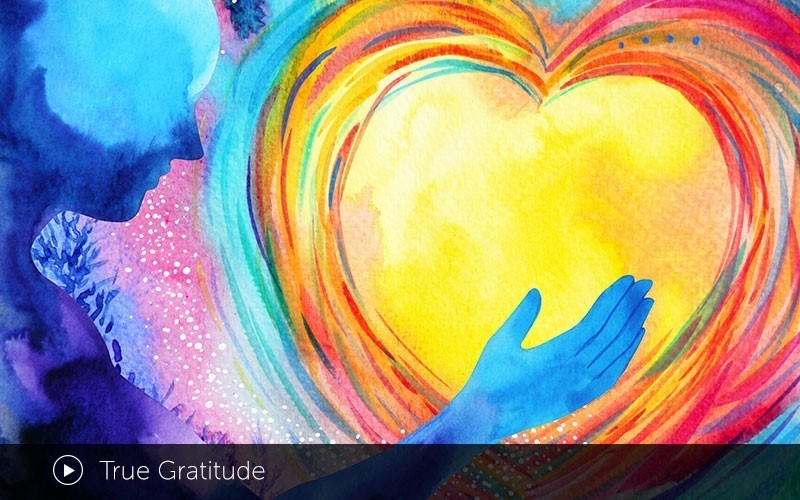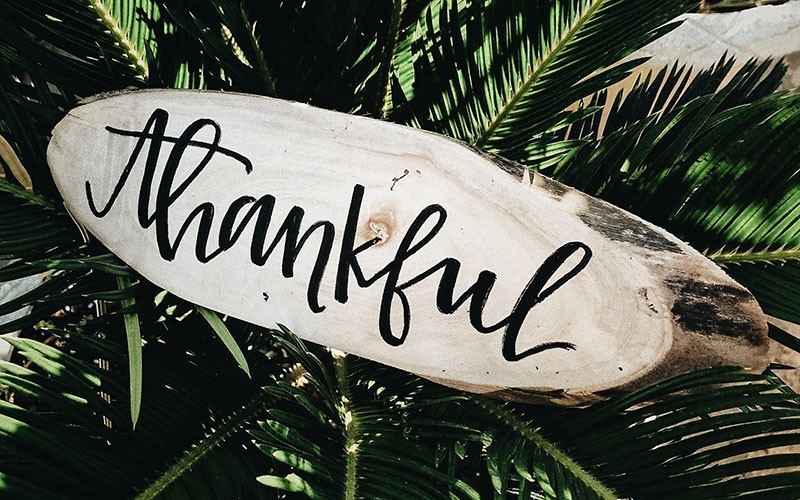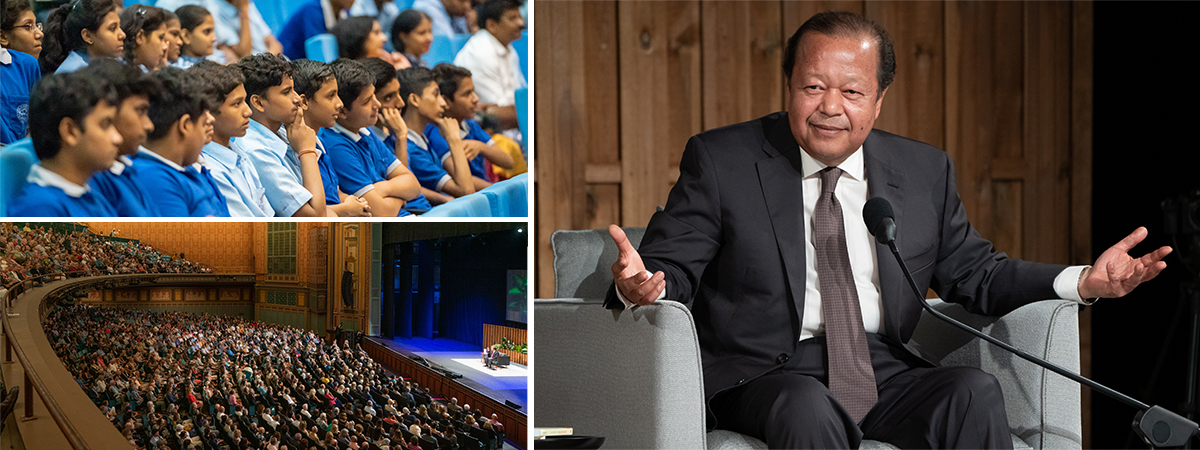Topics
 00:05:50
Coming and Going
Video
Duration : 00:05:50
Is the blessing of each breath obvious to you every time you breathe?
00:05:50
Coming and Going
Video
Duration : 00:05:50
Is the blessing of each breath obvious to you every time you breathe?
Whether Ram actually said this or not is irrelevant. And I am sure that Ram is not the one who sat down and wrote this. But he says—and this is obviously in some understanding on Ram’s behalf, some conclusion that this writer has, in which he says, "This is the vessel to go across the ocean of this world."
"What ocean?" Right? Ocean of ignorance. "This form that you have is the vessel to go across this ocean. The coming and going of this breath is my blessing. Coming and going of this breath is my blessing."
Wow. Wow. Wow, hmm-hmm. Coming of this breath, going of this breath is the blessing?
Is that obvious to you? Don’t shake your head yet; the question isn’t finished yet—is it obvious to you every time you breathe? Because it still is a blessing.
And this you have to feel in your life, acknowledge, understand in your life. No doubt. Not taking my word for it. Experiencing it for yourself, knowing—that’s what Knowledge is, hmm. Not reading in a book.
Because, putting something down in a book, it’s a real challenge. For me, it’s a real challenge. Because here I am offering words, but I’m also the same person who offers experience. And it’s a real dance! It’s a real dance. What can only be experienced should not be written about. And that’s a hell of a discipline—but it must be experienced.
I’m in a unique situation; I know that. If somebody comes to me, and says, "I have heard this thing called a 'mango.' What is it?" I am one of those people who doesn’t have to hand this person a book. I can hand him a mango.
There are other people who don’t have a mango; they can only offer him a book. But I am, it's slightly different; I have a slight different advantage; I can hand a mango. And hopefully, you're here to taste the mango.
- Prem Rawat
 00:07:22
True Gratitude
Video
Duration : 00:07:22
True gratitude is not manufactured; it’s real! It comes from within you.
00:07:22
True Gratitude
Video
Duration : 00:07:22
True gratitude is not manufactured; it’s real! It comes from within you.
I’m so glad that I’m here, at least, and have this opportunity to talk about something that’s very profound, very misinterpreted, but nonetheless very profound. And of course I’m talking about gratitude.
Now, why is it misinterpreted? Because people say to themselves, “Oh, I should feel more thankful in my life.” But you don’t! That’s the fact. Should you? Yes.
That’s like, you know, making a New Year’s resolution, but you don’t go through with it. Because what will you do the next year? You need to keep that one going, so you can say, “Oh, yeah, yeah, this year I’ll do it; this year I’ll do it.” And this is how we work.
But true gratitude is not manufactured. It’s real! It comes from within you—when the things are right—not when they are wrong, when things are right. So what are the things that have to be right for the truest gratitude to flow from a human being? One of the things that has to happen is, there has to be appreciation. But appreciation of what?
People say—and I’m not saying that this is wrong by any stretch of the imagination: “You should be thankful for your family.” You should be. But you’re only thankful to your family if they’re doing what you tell them to do.
If the situation reverses and the family is telling you to do things that you don’t want to do, you’re not going to be thankful. And, but, you know, okay, this is just how it is. Not right, not wrong, not good, not bad—but just this is how it is.
Your dog is happy to see you; he’s wagging his tail. He’s hoping you will give some attention, maybe a nice little snack perhaps. And when the dog realizes none of that’s going to happen, and you’re going to be busy doing your thing, the dog finds a place and sits down and it’s like, “And, okay.” All that “hah-ah-hah-ah-hah!” goes away.
So, interestingly enough, a few days ago, it was at nighttime, and I was up. And what had come to my mind that night was “Someone loves you”—just that. “Someone loves you.” Now of course, who is this someone?
Because we are very caught up in our names; we are very caught up in our nomenclature, how we address each other, how people address you, so on and so forth. I mean, it’s like, if somebody says—so, if your name is John and somebody says, “Hey Tom!”—you’ll go, “And no! I, it’s, I’m not Tom; I’m John!” What difference does it make?
Because if there is somebody called “Tom,” they’re made out of the same thing as you are—exactly! Maybe you look a little different, but that’s just rearranged molecules.
So, it’s not—the importance isn’t who that “someone” is. So it’s like, pointless to even, even try to figure out who that “someone” is, because you don’t have the capacity to figure out. You can have an imagination, but your imagination will fall short of the reality of who that “someone” is. So, knowing that it’s a futile attempt, I don’t even go there.
Ha! But ‘loves you!’ That’s good! And how do I know this? I know this because this gift of breath comes to me. I have been given an opportunity to be alive.
But when we come across our problem, we are so intrigued by that problem, and so willing to find a resolution to that problem that we blind ourselves to still what is going on around us.
That this breath still comes into me. That I still have an ocean of answers in me. That I have an ocean of clarity in me, that I have an ocean of kindness in me, that I have an ocean of joy in me. That I have simplicity in my life. That I have light in me. These things—regardless of what is happening.
- Prem Rawat
 00:00:24
Greatest Form of Prayer
Video
Duration : 00:00:24
The greatest form of prayer ... is to express my gratitude.
00:00:24
Greatest Form of Prayer
Video
Duration : 00:00:24
The greatest form of prayer ... is to express my gratitude.
I know people pray. I mean, excuse me, I’m, I’m very sorry if—I don’t mean to offend anybody. I know. But I, I have to say what I know. Not believe. Know. And I know the greatest form of prayer is to express my gratitude.
 00:03:32
Greed's Antidote
Video
Duration : 00:03:32
Appreciation kills greed.
00:03:32
Greed's Antidote
Video
Duration : 00:03:32
Appreciation kills greed.
People say, “World peace: not possible! Why? Because there’s so much greed.” So, one day I was thinking about that—“Greed, greed. Yeah, greed. There’s a lot of greed in this world.” And then I said “Well there must be an antidote to greed.” And I found it; it’s called “appreciation.”
Greedy people can never appreciate. They can’t! As soon as they start appreciating, you know what happens? You, the human, kicks in. And you know what your nature is? By the way, do you know what your nature is? When you like something—there’s a song playing on the radio that you like—“yeeeeh” goes the volume. You want to share it! You want to share.
Cooking in the kitchen—and you’re cooking something, and it’s good. What happens!? All the protocols go out. “Taste this. Taste this.” What!? No fork. No knife? No washing of the hands? No plate; no this; no that? “No, here, taste—taste, taste this.” This is the human being!
You are putting on that dress, and you look beautiful in that. And what do you want to do!? Show it. Show it.
Appreciation kills greed. In all the greed in the world—it’s there, but they don’t appreciate, because they’re only on one track: “More. More. More. More. More. More.” If they start appreciating it—if they actually start enjoying what they have—they’ll go, “Wow, this is good! Let me share this!” Because that’s human nature—and you are a human being.
The journey to the self, then, is truly a journey to you. It’s called, “Come home. Come home!” And you will see the world change for you, because, remember, you have to make peace with the world. The world isn’t going to make peace with you. You have to make peace with the world.
- Prem Rawat
 00:04:44
Be Comfortable
Audio
Duration : 00:04:44
When you are in kindness, it feels comfortable.
00:04:44
Be Comfortable
Audio
Duration : 00:04:44
When you are in kindness, it feels comfortable.
In this life humility is better than pride—to be humble—because it allows you to see, to witness. That to be thankful is better than not being thankful—because being thankful allows you to see a part of your existence that you would have never seen.
So, these are the windows in our life. To try every day—simplicity is better than being complicated. Now one’s effort is to stay in that place. There is all too much in this world—everything, everything!—that pulls on you. It grabs you and says, “No, come here! Do this! Be like this.”
But to remember that that’s the true nature, the true nature of a human being. It is natural for you to have a heart full of gratitude. It is natural for you to be kind. It is unnatural to be angry. It is natural to be kind—that’s your true nature. It is natural for you to be humble. To be in pride is not natural. It’s not real.
Because when you go to that point where it is doubt instead of clarity, where it is pride instead of humility, things happen that you won’t like. And when you are in the place where there is the kindness, where there is the joy, where there is the gratitude—then what will happen you will like. There will be a simplicity.
So, when you’re with kindness, what do you feel? What does it feel? It feels comfortable. But when you are not in kindness, when you’re not in that humility, when you’re not in that clarity, when you’re not in that understanding, when there isn’t that openness, it doesn’t feel comfortable.
And now, that discomfort has been going on for such a long time that you start to get used to it. So then the only time you realize you were uncomfortable is when you truly do become comfortable, and that’s when you realize, “Oh my God! I didn’t know! I got used to it.”
I am not a doctor. I’m not a doctor, but I can tell you that, when it comes to the inner realm, you cannot start taking pills and not take care of what’s wrong. And what is wrong is the understanding. What is wrong—that the clarity has been lost.
When you bring in that clarity, there is a desire, there is a want to be comfortable. And those dynamics persist in our existence. When we lose that focus, we start to become uncomfortable—then everything else happens.
And so my point is, “Don’t lose that comfort.” There are too many things in this world that’ll distract you. This is what you learn. And you always have something to be thankful about.
When it seems like you have nothing to be thankful for, when everything hits the fan and it all goes crazy—I mean, and really, really crazy—like one of those days when you feel like you’ve been singled out for it? I mean everything has got you in the sight? Find something to be thankful for, find something to understand—and it will, like magic, reverse the trend.
So what I’m saying to you in a nutshell is, “Don’t compromise.” If there is a discomfort, it’s because there is a shift in focus on what you should be focusing on. And if that reality remains constant with you, then there will be a comfort. And that’s how you’re supposed to be. That’s how you are supposed to be.
– Prem Rawat
 00:02:01
Your Gift of Choice
Video
Duration : 00:02:01
This creation has given a gift to you: it’s called “life.” If you don’t accept i...
00:02:01
Your Gift of Choice
Video
Duration : 00:02:01
This creation has given a gift to you: it’s called “life.” If you don’t accept i...
If somebody gives you a gift—if somebody gives you a gift and you don’t accept it, whose gift is it anyways? It’s not a tricky question; I’m not trying to trick you. It’s just a straightforward question: “If somebody gives you a gift and you don’t accept it, whose gift is it anyways?”
I mean, it’s simple as this. Here’s a handkerchief; it’s my handkerchief. If I give it to you and say, “Here,” and you say, “No,” whose handkerchief is it? [Audience: Yours.] Thank you. That’s what I thought, too. I was starting to have doubts.
And I use it two ways. Somebody says something bad to you; that’s their gift to you. If you don’t accept it, whose is it? Theirs; not yours. So that’s one thing.
How about the other way? This creation has given a gift to you: it’s called “life.” If you don’t accept it, whose is it? Not yours. Not yours—or should it be yours? If you want it to be yours, you have to accept it. And once you accept it, you will understand what it is.
– Prem Rawat





